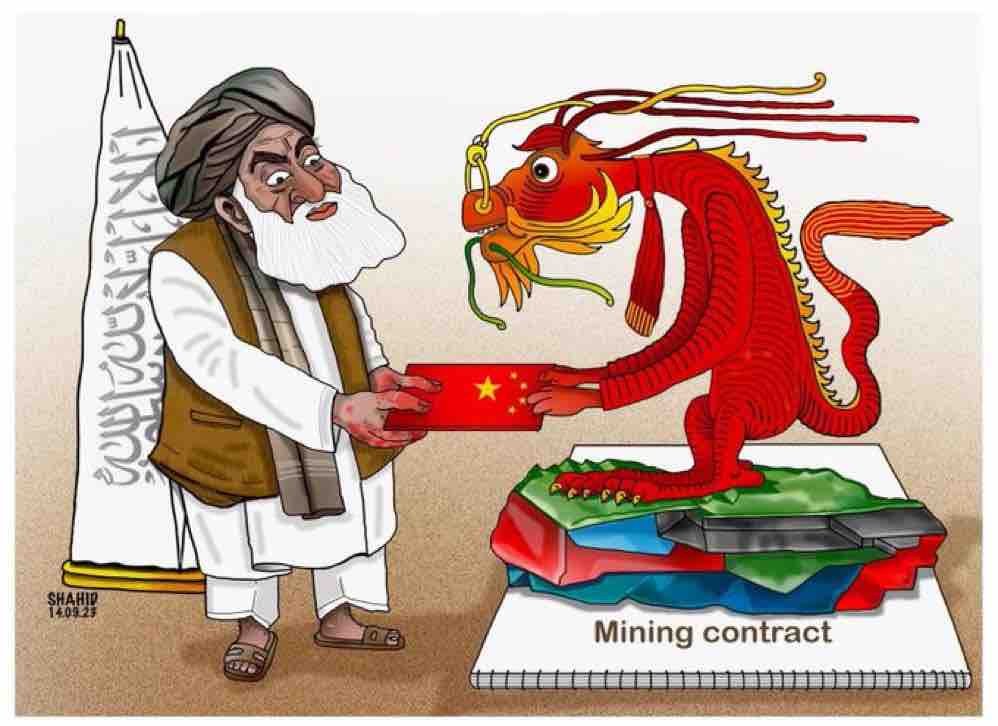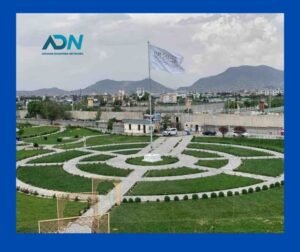Exploitation of Afghan’s Resources: A Concerning Partnership with China

By Hamid Pakteen
Two years since taking control of Afghanistan, the Taliban have neither been able to mobilize stable financial sources to revive the dwindling Afghan economy nor gain wider international recognition. Though many countries have maintained diplomatic establishments in Kabul, none has recognized the Taliban. The reception given by Taliban leadership to the newly appointed Chinese Ambassador in Kabul shows the desperation of the Taliban to reach out for formal recognition. However, Beijing is cautious in its approach, with the only incentive being the unmined natural resources of Afghanistan. This article delves into the complex dynamics between China, the Taliban, and the valuable resources that lie beneath Afghanistan’s soil.
Afghanistan, a land rich in natural resources, has become a focal point in the geopolitical landscape. It is estimated to have trillions of dollars worth of rare earth metals, making it a highly desirable region for countries like China. These minerals, which include lanthanum, cerium, neodymium, and more, are crucial components in various industries, such as electronics, electric vehicles, satellites, and aircraft. The potential value of these resources has led to a scramble for influence and control over Afghanistan’s mineral wealth.
China’s Strategic Interest in Afghanistan
Since last year, Chinese firms have increased the frequency of visits to Afghanistan in their quest to explore various business prospects and establish agreements, particularly within the mining sector.
In January 2023, China’s Xinjiang Central Asia Petroleum and Gas Co signed an agreement with the Taliban for oil extraction activities in the Amu Darya basin situated in the northern regions of Afghanistan. Similarly, in July 2023, the Taliban reported that Fan China Afghan Mining Processing and Trading Company, a Chinese enterprise, has intentions to infuse approximately $350 million into Afghanistan’s economy. This investment is claimed to have been earmarked for diverse sectors such as electricity generation, cement production, and healthcare. Though these agreements/promises of investments have so far remained on paper, they seem to create a euphoria of active engagement between China and the Taliban.
Beyond economic gains, China’s interest in Afghanistan is also with an aim to solidify its influence in the region, reducing the space for Western powers and ensuring unhindered access to valuable economic and natural resources. By projecting itself as a savior to the Taliban, China seeks to secure economic aid and business opportunities in Afghanistan, all while advancing its own strategic interests. With Pakistan losing its sovereignty and becoming fully dependent on China, adding Afghanistan to its kitty would cement the monopolistic control of China in this crucial Central Asian region.
The Concerns of Exploitation and Debt-Trap Diplomacy
While China’s involvement in Afghanistan may seem beneficial on the surface, there are concerns about the potential exploitation of the country’s resources. China has a track record of engaging in debt-trap diplomacy, luring countries into unsustainable debts that ultimately give China significant leverage and control. Afghanistan could fall victim to this pattern, leading to long-term consequences for its people.
The case of Zambia serves as a cautionary tale for Afghanistan. The African nation fell into a debt trap with China, resulting in significant economic and political consequences. Afghanistan must learn from Zambia’s experience and avoid becoming entangled in unsustainable debts that could jeopardize its sovereignty and long-term development.
Further, China’s track record on human rights fully aligns with the Taliban. Both are authoritarian regimes with zero concern for the rights of the people. The international community has been pushing the Taliban on the issue of women’s rights and the rights of minorities in Afghanistan. China would be least bothered on this front and instead tacitly support the exploitation of Afghan people as it would be in their self-interest. However, the international community must ensure that any alliances between China and the Taliban adhere to international standards, prioritizing human rights and the well-being of the Afghan people.
It is important that Afghanistan’s resources should be leveraged for the benefit of its people, promoting sustainable development and long-term prosperity. It should not be allowed to be plundered by another authoritarian regime as it has done in Africa during the last decade under the pretext of BRI.
The author chooses a single pseudonym. Hamid Pakteen is a researcher based in Afghanistan. Note: The contents of the article are of sole responsibility of the author. Afghan Diaspora Network will not be responsible for any inaccurate or incorrect statement in the articles.








